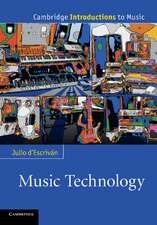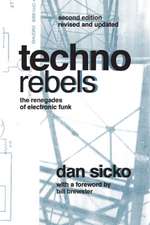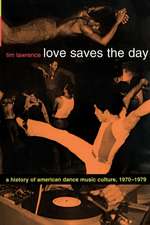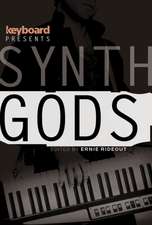Liveness in Modern Music: Musicians, Technology, and the Perception of Performance: Routledge Research in Music
Autor Paul Sandenen Limba Engleză Hardback – 18 dec 2012
| Toate formatele și edițiile | Preț | Express |
|---|---|---|
| Paperback (1) | 416.22 lei 6-8 săpt. | |
| Taylor & Francis – 24 mai 2017 | 416.22 lei 6-8 săpt. | |
| Hardback (1) | 1102.88 lei 6-8 săpt. | |
| Taylor & Francis – 18 dec 2012 | 1102.88 lei 6-8 săpt. |
Din seria Routledge Research in Music
-
 Preț: 311.41 lei
Preț: 311.41 lei -
 Preț: 324.89 lei
Preț: 324.89 lei -
 Preț: 312.81 lei
Preț: 312.81 lei -
 Preț: 325.35 lei
Preț: 325.35 lei - 9%
 Preț: 935.56 lei
Preț: 935.56 lei -
 Preț: 312.28 lei
Preț: 312.28 lei -
 Preț: 290.00 lei
Preț: 290.00 lei -
 Preț: 389.38 lei
Preț: 389.38 lei - 19%
 Preț: 223.07 lei
Preț: 223.07 lei -
 Preț: 438.05 lei
Preț: 438.05 lei - 17%
 Preț: 256.32 lei
Preț: 256.32 lei -
 Preț: 466.45 lei
Preț: 466.45 lei - 18%
 Preț: 1000.45 lei
Preț: 1000.45 lei -
 Preț: 416.22 lei
Preț: 416.22 lei - 21%
 Preț: 257.49 lei
Preț: 257.49 lei - 18%
 Preț: 1000.27 lei
Preț: 1000.27 lei - 13%
 Preț: 310.55 lei
Preț: 310.55 lei -
 Preț: 324.74 lei
Preț: 324.74 lei - 18%
 Preț: 998.71 lei
Preț: 998.71 lei - 18%
 Preț: 894.39 lei
Preț: 894.39 lei -
 Preț: 311.41 lei
Preț: 311.41 lei -
 Preț: 489.26 lei
Preț: 489.26 lei - 18%
 Preț: 1000.27 lei
Preț: 1000.27 lei - 18%
 Preț: 1050.09 lei
Preț: 1050.09 lei -
 Preț: 437.71 lei
Preț: 437.71 lei - 18%
 Preț: 1119.87 lei
Preț: 1119.87 lei -
 Preț: 388.72 lei
Preț: 388.72 lei -
 Preț: 389.22 lei
Preț: 389.22 lei - 31%
 Preț: 765.03 lei
Preț: 765.03 lei -
 Preț: 420.08 lei
Preț: 420.08 lei - 18%
 Preț: 1003.93 lei
Preț: 1003.93 lei - 18%
 Preț: 1054.97 lei
Preț: 1054.97 lei -
 Preț: 391.14 lei
Preț: 391.14 lei - 18%
 Preț: 834.72 lei
Preț: 834.72 lei
Preț: 1102.88 lei
Preț vechi: 1344.98 lei
-18% Nou
Puncte Express: 1654
Preț estimativ în valută:
211.03€ • 220.93$ • 174.62£
211.03€ • 220.93$ • 174.62£
Carte tipărită la comandă
Livrare economică 05-19 aprilie
Preluare comenzi: 021 569.72.76
Specificații
ISBN-13: 9780415895408
ISBN-10: 0415895405
Pagini: 220
Ilustrații: 1 black & white tables, 2 black & white halftones, 11 black & white line drawings
Dimensiuni: 152 x 229 x 23 mm
Greutate: 0.27 kg
Ediția:1
Editura: Taylor & Francis
Colecția Routledge
Seria Routledge Research in Music
Locul publicării:Oxford, United Kingdom
ISBN-10: 0415895405
Pagini: 220
Ilustrații: 1 black & white tables, 2 black & white halftones, 11 black & white line drawings
Dimensiuni: 152 x 229 x 23 mm
Greutate: 0.27 kg
Ediția:1
Editura: Taylor & Francis
Colecția Routledge
Seria Routledge Research in Music
Locul publicării:Oxford, United Kingdom
Public țintă
Postgraduate and UndergraduateCuprins
1. Introduction 2. A Theory of Liveness in Mediatized Music 3. Hearing Glenn Gould’s Body: Corporeal Liveness in Recorded Music 4. Reconsidering Fidelity: Authenticity, Historicism, and Liveness in the Music of The White Stripes 5. Interactive Liveness in Live Electronic Music 6. Virtual Liveness and Sounding Cyborgs: John Oswald’s "Vane" 7. Performing Cyborgs: The Flaying of Marsyas and Turntablism 8. Conclusion Notes References Index
Notă biografică
Paul Sanden teaches Music History at the University of Lethbridge, Canada.
Descriere
This study investigates the idea and practice of liveness in modern music. Understanding what makes music live in an ever-changing musical and technological terrain is one of the more complex and timely challenges facing scholars of current music, where liveness is typically understood to represent performance and to stand in opposition to recording, amplification, and other methods of electronically mediating music. The book argues that liveness itself emerges from dynamic tensions inherent in mediated musical contexts—tensions between music as an acoustic human utterance, and musical sound as something produced or altered by machines. Sanden analyzes liveness in mediatized music (music for which electronic mediation plays an intrinsically defining role), exploring the role this concept plays in defining musical meaning. In discussions of music from both popular and classical traditions, Sanden demonstrates how liveness is performed by acts of human expression in productive tension with the electronic machines involved in making this music, whether on stage or on recording. Liveness is not a fixed ontological state that exists in the absence of electronic mediation, but rather a dynamically performed assertion of human presence within a technological network of communication. This book provides new insights into how the ideas of performance and liveness continue to permeate the perception and reception of even highly mediatized music within a society so deeply invested, on every level, with the use of electronic technologies.









